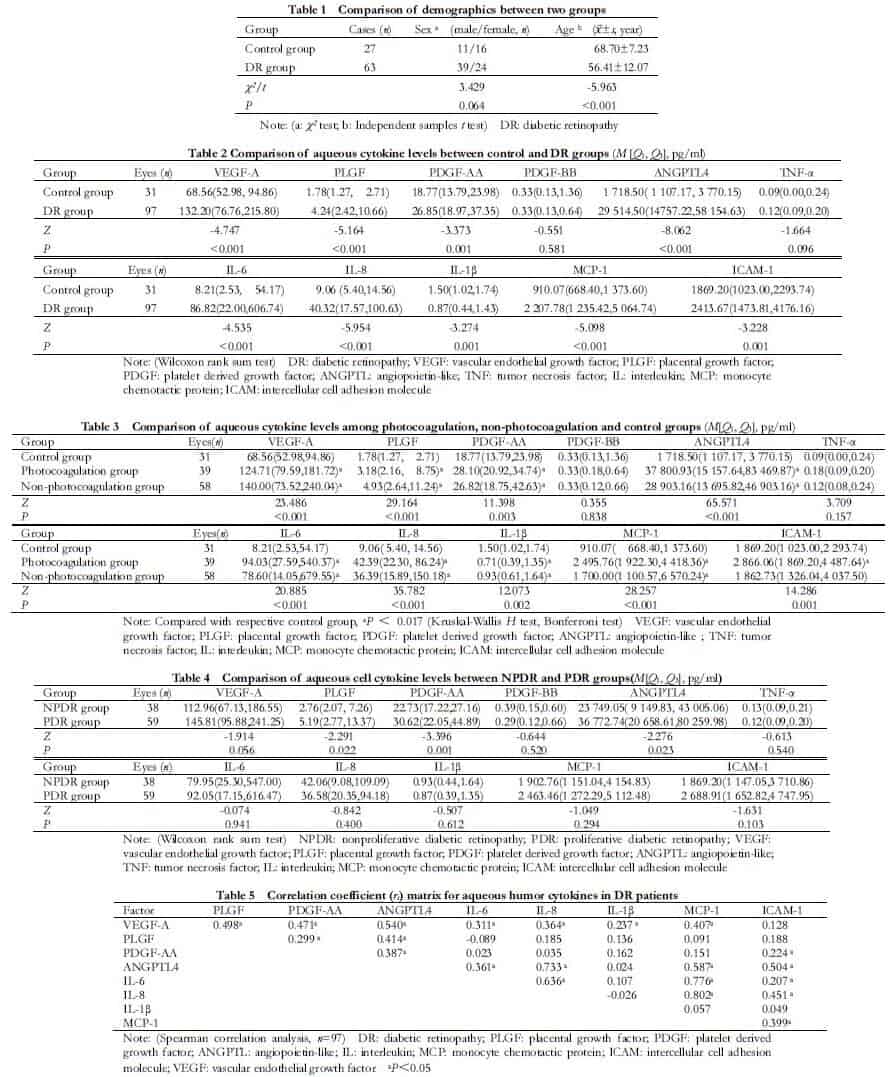Abstract [Download PDF] [Read Full Text]
Objective
To detect the concentration of various cytokines in aqueous humor of patients with diabetes retinopathy (DR) with Luminex liquid chip, and analyze the relationship between the cytokines and the occurrence and development of DR.
Methods
A cross-sectional study was conducted.Sixty-three DR patients (97 eyes) treated with anti-vascular endothelial growth factor (VEGF) drugs in the First Affiliated Hospital of Guangzhou University of Traditional Chinese Medicine from March 1, 2019 to December 31, 2019 were enrolled as DR group, including 38 nonproliferative DR (NPDR) eyes in NPDR group and 59 proliferative DR (PDR) eyes in PDR group, 39 eyes in photocoagulation group and 58 eyes in non-photocoagulation group.Twenty-seven patients (31 eyes) hospitalized for cataract surgery at the same time were collected as the control group.Aqueous humor was extracted during the operation, and Luminex liquid chip was used to detect the concentrations of vascular endothelial growth factor-A (VEGF-A), placental growth factor (PLGF), platelet-derived growth factor (PDGF)-AA, PDGF-BB, angiopoietin-like protein 4 (ANGPTL4), interleukin-6 (IL-6), IL-8, IL-1β, monocyte chemotactic protein-1 (MCP-1), intercellular cell adhesion molecule-1 (ICAM-1) and tumor necrosis factor-α (TNF-α) in aqueous humor.The concentrations of various cytokines of different groups were compared, and the correlation among various aqueous humor cytokines was analyzed by Spearman rank correlation analysis.This study adhered to the Declaration of Helsinki.The study protocol was approved by the Ethics Committee of First Affiliated Hospital of Guangzhou University of Chinese Medicine (No.Y[2019]230). Written informed consent was obtained from each patient.
Results
The concentrations of VEGF-A, PLGF, PDGF-AA, ANGPTL4, IL-6, IL-8, MCP-1 and ICAM-1 in DR group were significantly higher and the concentration of IL-1β was significantly lower than those of control group (Z=-4.747, -5.164, -3.373, -8.062, -4.535, -5.954, -5.098, -3.228, -5.954, all at P<0.01). The concentrations of VEGF-A, PLGF, PDGF-AA, ANGPTL4, IL-6, IL-8 and MCP-1 of the photocoagulation and non-photocoagulation groups were higher and the concentration of IL-1β was significantly lower than those in the control group (all at P<0.017). The concentration of ICAM-1 in the photocoagulation group was significantly higher than that in the control group (P<0.017). The concentrations of PLGF, PDGF-AA and ANGPTL4 of PDR group were higher than those of NPDR group, and the differences were statistically significant (Z=-2.291, -3.396, -2.276, all at P<0.05). VEGF-A was positively correlated with the other cytokines except ICAM-1 (rs=0.237-0.540, all at P<0.05). ANGPTL4 was positively correlated with the other cytokines except IL-1β (rs=0.361-0.733, all at P<0.01).
Conclusions
The occurrence and development of DR are closely related to VEGF family, PDGF family, ANGPTL family and inflammatory factors.The concentrations of PLGF, PDGF-AA and ANGPTL4 are higher in PDR eyes.There are close and complex relationships among a variety of cytokines in the eyes of DR patients.
Key words:
Figures & Tables

Contributor Information
Department of Ophthalmology, First Affiliated Hospital of Guangzhou University of Chinese Medicine, Guangzhou 510405, China
Department of Ophthalmology, Guangdong Provincial Second Hospital of Traditional Chinese Medicine, Guangzhou 510095, China
Department of Ophthalmology, First Affiliated Hospital of Guangzhou University of Chinese Medicine, Guangzhou 510405, China
Department of Ophthalmology, First Affiliated Hospital of Guangzhou University of Chinese Medicine, Guangzhou 510405, China
Zhang Ruting is now working at Aier School of Ophthalmology, Central South University, Changsha 410083
Department of Ophthalmology, First Affiliated Hospital of Guangzhou University of Chinese Medicine, Guangzhou 510405, China
Li Junhui is now working at Qingdao Xinshijie Ophthalmology Hospital, Qingdao 266000
Department of Ophthalmology, First Affiliated Hospital of Guangzhou University of Chinese Medicine, Guangzhou 510405, China
Department of Ophthalmology, First Affiliated Hospital of Guangzhou University of Chinese Medicine, Guangzhou 510405, China
Department of Ophthalmology, First Affiliated Hospital of Guangzhou University of Chinese Medicine, Guangzhou 510405, China